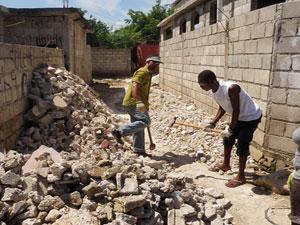Creating jobs in Haiti
Haitians at work (Image by Flickr user EDV Media Director (cc:by))
by Clark Boyd
Unemployment and underemployment were huge problems in Haiti even before last year’s devastating earthquake. And despite the influx of aid groups, and millions of dollars in aid, many Haitians remain without a job. But two students from the Massachusetts Institute of Technology are trying to help Haitians get back to work by using a tool many already carry in their hands — a cell phone.
Aaron Zinman and Greg Elliott, both with MIT’s Media Lab, got the idea after sitting in on a class that MIT pulled together in the wake of the earthquake. The purpose of the class was to brainstorm ways MIT could help.
Zinman remembers one fact he learned in the class that astonished him. “In Haiti, NGOs bring in their own outside labor,” he recalls, “rather than trying to hire locally.”
Not all NGOs do this, says Greg Elliott. The established ones that have been working in Haiti for a long time and have strong contacts in the community, he notes, tend to hire more locals.
But many of the new aid groups that have arrived in the past year do not have that network, or the language skills. “And because they’re such a dominant force in the country, that’s really a problem,” Zinman says. “Especially post-earthquake, when you have all this money being pledged and not much of it making it to the Haitian public.”
So Zinman teamed up Elliott, and the two started thinking about ways that technology might be used to match Haitians, and their job skills, with NGOs in need of workers. They batted around a few ideas, but ultimately decided to design something around the cell phone.
“A lot of people, despite their living conditions would have some sort of cell phone or access to a cell phone,” says Elliott.
So Elliott and Zinman developed a system called Konbit, a Creole word for a traditional kind of communal labor where skills are bartered among members of the community, for the good of the community. It is, essentially, a glorified phone tree for Haitians looking for work.
You can dial into Konbit from anywhere in Haiti, courtesy of local cell provider Digicel. You are then greeted by what’s probably a familiar voice, at least if you’re Haitian. The team got veteran broadcaster Bob Lemoine to record the voice prompts.
“His voice is great,” says Zinman. “It was good to have a voice that Haitians would trust.”
After a brief welcome message, Konbit then leads you through a series of those all too familiar voice prompts, asking if you have certain kinds of work experience.
Engineering, leadership and nursing are Konbit categories. So, too, are babysitting and sewing. When you find an area where you have expertise, you can leave a detailed voice mail message highlighting your skills.
“We wanted to figure out how we could help people tell stories about their lives,” Elliott says.
“What have they done over time? Have they taken care of loved ones? Have they had any sort of experience necessary to do jobs? And then we do the work of translating that into a format that the NGOs expect and would be able to search and things like that.”
Konbit has only been up and running as a pilot project for a couple of weeks, but already the system has logged more than 500 calls.
For now, a local Haitian company has been contracted to translate the messages from Creole into French and English. Ultimately, though, the Konbit team would like to get the Haitian diaspora involved, and crowdsource the translation.
Zinman and Elliott say that the NGOs they’ve approached have expressed interest in the project, but that they want to see it in action first. They say the first translated resumes should be ready for aid groups to look at any day now.
PRI’s “The World” is a one-hour, weekday radio news magazine offering a mix of news, features, interviews, and music from around the globe. “The World” is a co-production of the BBC World Service, PRI and WGBH Boston. More about The World.
